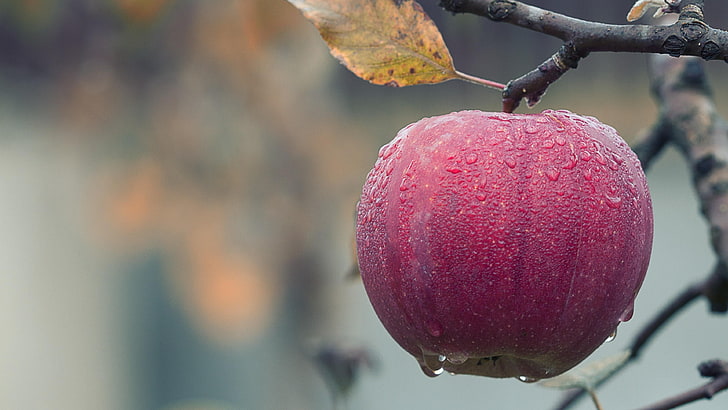India’s Apple Industry in Crisis as Devastating Heavy Rains Damage Crops: A Catastrophic Blow to Farmers and Economy.

India’s Apple Industry in Crisis as Devastating Heavy Rains Damage Crops: A Catastrophic Blow to Farmers and Economy.
In a devastating blow to India’s apple growers, heavy rains have wreaked havoc on their orchards, causing significant damage to crops and plunging the industry into a crisis. The regions of Himachal Pradesh and Jammu and Kashmir, known for their picturesque apple orchards, have been hit the hardest, leaving farmers grappling with the aftermath of nature’s fury.

For decades, apple cultivation has been a vital source of income for many farmers in these regions. The lush green hills dotted with apple trees have not only provided sustenance to local communities but have also contributed significantly to the country’s agricultural economy. However, this year’s unrelenting monsoon rains have shattered the dreams of a prosperous harvest.
The apple season began with the usual anticipation and optimism among farmers, hoping for bountiful yields that would fetch them good returns. However, Mother Nature had other plans. The heavens opened up, unleashing torrential rains that persisted for an extended period. The saturated soil could not absorb the excessive water, leading to waterlogging in the orchards. The excess moisture deprived the apple trees of essential nutrients and oxygen, causing them to weaken and rot at their roots.
As the rains continued to lash the region, the apple farmers watched helplessly as their months of hard work and investment were washed away. The waterlogged orchards became breeding grounds for pests and diseases, compounding the farmers’ misery. Many farmers reported cases of fungal infections and apple scab, which further reduced the quality and marketability of their produce.

The impact of this crisis is not limited to just the current season. Apple trees, damaged and weakened by the heavy rains, will require extensive care and rehabilitation to recover fully. Experts predict that it may take several years for the apple industry to bounce back to its former glory, as farmers will need to replant trees and implement effective soil management strategies to restore the fertility of the land.
Furthermore, the economic repercussions of this crisis extend beyond the farmers to the larger apple supply chain. Local traders, transporters, and packaging industries, heavily dependent on the apple harvest, are also facing significant losses. The apple industry is an interconnected web, and the decline in production has a cascading effect on the livelihoods of countless people associated with it.
As the recovery efforts continue, the resilience and determination of India’s apple farmers come to the forefront. Despite the challenges they face, many farmers are actively seeking ways to rebuild and adapt to the changing climate patterns. Local cooperatives and community-driven initiatives are providing a platform for farmers to share their experiences, exchange knowledge, and collectively address the crisis.
One such initiative gaining momentum is the promotion of climate-smart agriculture techniques. Farmers are being encouraged to diversify their crops and adopt resilient farming methods that can better withstand extreme weather events. By integrating practices like rainwater harvesting, drip irrigation, and organic farming, farmers aim to conserve water, improve soil health, and reduce dependency on chemical inputs.
Government agencies, agricultural universities, and non-governmental organizations (NGOs) are playing pivotal roles in providing training and technical support to farmers. Workshops and seminars are being organized to educate farmers about modern practices, best management techniques, and innovative technologies that can enhance their productivity and adaptability to climate change.
The Indian government, recognizing the severity of the situation, has dispatched agricultural experts and relief teams to assess the damage and offer assistance to the affected farmers. Various state and federal schemes have been initiated to provide financial aid and access to resources for the rehabilitation process. However, the road to recovery is arduous and will require sustained efforts from all stakeholders.
Beyond the immediate crisis, the situation calls for a broader discussion on climate change and its effects on agriculture. India’s apple industry is just one of the many sectors that have fallen victim to the unpredictable climate patterns in recent years. Urgent action to curb greenhouse gas emissions and promote sustainable practices is crucial to safeguarding the livelihoods of millions of farmers and preserving the nation’s agricultural heritage.
The crisis has also sparked public awareness about the impacts of climate change on agriculture. Citizens and consumers are becoming more conscious of the importance of supporting local farmers and adopting eco-friendly practices in their daily lives. Initiatives such as “buy local” campaigns and organic food movements are gaining traction, contributing to a more sustainable and resilient agricultural ecosystem.
Despite the challenges, there is a glimmer of hope on the horizon. As the rebuilding process gains momentum, there are stories of farmers who, through sheer determination and hard work, have managed to salvage parts of their orchards and replant new apple saplings. These tales of resilience are a testament to the indomitable spirit of India’s agricultural community.
In conclusion, the heavy rains that have battered India’s apple-growing regions have caused immense damage to the industry, leaving farmers struggling to recover. The impact of this crisis reaches far beyond the orchards, affecting the entire supply chain and local economies. As the nation grapples with the aftermath, there is a pressing need for sustainable agricultural practices and climate change mitigation strategies to build a more resilient future for India’s apple growers and their communities.




